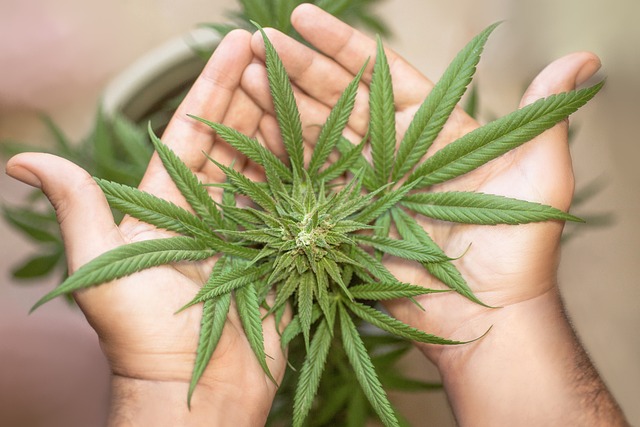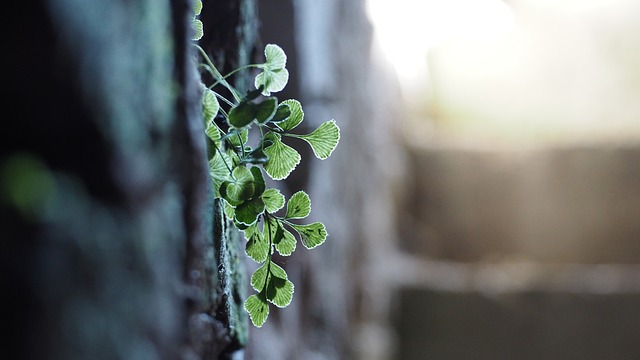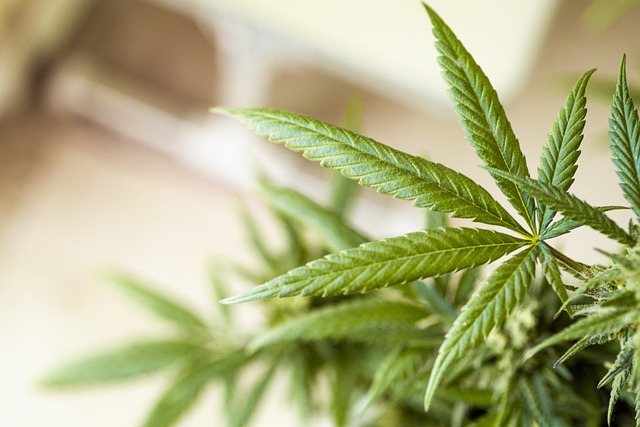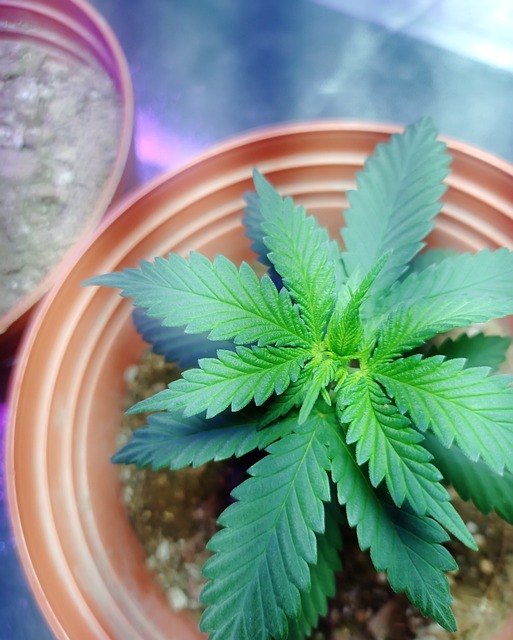Residents of Montana can legally engage with THCA (tetrahydrocannabinolic acid), a non-psychoactive cannabinoid found in cannabis plants, thanks to the state's progressive cannabis regulations. THCA is celebrated for its therapeutic properties, including potential benefits such as pain relief, anti-inflammatory effects, and neuroprotection, which are preserved in its natural state before heat conversion to psychoactive THC. Montana's climate and clear legal guidelines make it an ideal setting for cultivating high-quality THCA flower. Users are encouraged to explore the various strains and start with low doses due to individual body chemistry's impact on efficacy. With a flourishing market and numerous dispensaries, Montana provides ample access to THCA products. It's crucial for consumers to purchase from licensed sources to ensure legal compliance and safety. The state's regulatory framework includes strict cultivation guidelines to preserve the integrity of THCA and prevent its conversion into other cannabinoids. Understanding the legality and responsible use of THCA within Montana's laws is key for a safe and beneficial experience with this cannabinoid.
Explore the intricacies of THCA flower and its legal status in Montana through an in-depth guide tailored for residents. Delve into the science behind this non-psychoactive cannabinoid, understanding why it’s legally embraced within the state’s regulatory framework. This article offers a practical approach to cultivating and consuming THCA flower, ensuring compliance with Montana’s cannabis laws while highlighting its potential benefits. Join us as we unlock the full potential of THCA legal in Montana.
- Unlocking the Potential of THCA Flower: A Comprehensive Guide for Montana Residents
- The Science Behind THCA: What Makes It Legal and Beneficial in Montana
- Cultivating and Consuming THCA Flower: A Practical Approach in Compliance with Montana Laws
Unlocking the Potential of THCA Flower: A Comprehensive Guide for Montana Residents

Discovering the potential of THCA flower offers a unique opportunity for residents of Montana, especially with its legal status in the state. Tetrahydrocannabinolic acid (THCA) is the raw, non-psychoactive precursor to delta-9 tetrahydrocannabinol (THC), the primary psychoactive component found in cannabis. As of current legislation, Montana has established a comprehensive framework for the use and sale of THCA flower, allowing enthusiasts to explore its properties. The THCA molecule is renowned for its therapeutic benefits, which include pain relief, anti-inflammatory effects, and potential neuroprotective qualities. Consuming THCA flower ensures that users experience the cannabinoid in its most natural form, untouched by heat, which would otherwise convert it into THC. This allows Montana residents to harness the full spectrum of benefits that THCA has to offer, including a clear-headed high that is distinct from that of THC.
When considering the use of THCA flower, Montana’s residents should be aware of the various strains available, as well as the correct dosing and consumption methods. The efficacy of THCA can vary based on strain selection and individual body chemistry. It is advisable to start with a low dose to gauge effects before increasing intake. Additionally, Montana’s climate and soil conditions favor the growth of high-quality cannabis, positioning the state as a prime location for cultivating THCA flower. With a growing market and an increasing number of dispensaries, Montana residents have access to a variety of THCA products, ensuring that they can make informed decisions about their consumption practices. Whether used for wellness or recreational purposes, understanding the legality, benefits, and best practices for using THCA flower in Montana is crucial for a safe and positive experience.
The Science Behind THCA: What Makes It Legal and Beneficial in Montana

Delta-9-tetrahydrocannabinolic acid, commonly known as THCA, is a naturally occurring compound found in the Cannabis sativa plant. In its raw, unheated state, THCA possesses distinct properties that differentiate it from other cannabinoids. Unlike its isomer delta-9-THC, which is psychoactive and illegal under federal law but legal for medical and recreational use in states like Montana, THCA itself does not have psychoactive effects. This unique characteristic makes it a subject of interest for individuals seeking the potential wellness benefits associated with cannabis without the high.
The legality of THCA in Montana hinges on its molecular structure and the specific laws governing cannabinoids within the state. According to Montana’s legislation, THCA is legal as long as it is derived from hemp compliant with the 2018 Farm Bill. This bill defined hemp as cannabis containing less than 0.3% delta-9-THC on a dry weight basis, effectively distinguishing it from its psychoactive counterpart. THCA’s legal status in Montana allows for the exploration and utilization of its potential health benefits, which include anti-inflammatory, neuroprotective, and analgesic properties. Scientific research continues to investigate these properties, offering insight into how THCA might interact with the body’s endocannabinoid system, potentially providing relief for various conditions without inducing a high.
Cultivating and Consuming THCA Flower: A Practical Approach in Compliance with Montana Laws

Montana’s progressive approach to cannabis legislation has paved the way for cultivators and consumers to engage with cannabinoids in a legal framework. Among these, THCA (Tetrahydrocannabinolic Acid), the precursor to THC (Delta-9-Tetrahydrocannabinol), has gained attention for its potential wellness benefits. Cultivating THCA-rich flowers in Montana requires adherence to state regulations, which include obtaining a license from the Montana Department of Public Health and Human Services. Growers must follow stringent guidelines, including ensuring their crop is not accessible by minors and maintaining security measures to prevent diversion. The cultivation process involves careful attention to the plant’s environmental conditions, such as light exposure, temperature, and humidity, to preserve THCA’s integrity. This is crucial because THCA flowers can degrade into THC or CBN (Cannabinol) under improper curing conditions, altering their effects and potency.
For those looking to consume THCA flowers in compliance with Montana laws, it is essential to purchase from licensed dispensaries or cultivators. Consumption methods can vary, with some preferring smoking or vaporizing for immediate effects, while others opt for infusions into edibles or topicals. It’s important to start with a low dose to assess individual sensitivity, as the psychoactive effects of THCA are more subdued than those of its decarboxylated form, THC. Montana’s legal landscape allows for both medical and recreational use, but always prioritizes safety and responsibility. Users must be aware of the state’s limits on possession and cultivation to avoid any legal repercussions. Understanding the nuances of THCA legality in Montana ensures a practical approach to its cultivation and consumption, aligning with the state’s regulatory framework and enhancing the user experience.
Montana’s progressive stance on cannabis has paved the way for residents to explore and benefit from the potential of THCA flower, a non-psychoactive form of cannabis that holds significant wellness promise. This article has delved into the legal landscape of THCA in Montana, elucidating its scientific foundations, optimal cultivation practices, and responsible consumption methods within the state’s regulatory framework. As we conclude, it’s clear that THCA’s legal status in Montana offers a unique opportunity for those interested in exploring this natural compound. Whether for personal use or as a component in health and wellness routines, understanding THCA flower is essential for Montanans looking to navigate this emerging market responsibly and effectively. With the right knowledge and approach, residents can fully harness the benefits of THCA legal in Montana.
